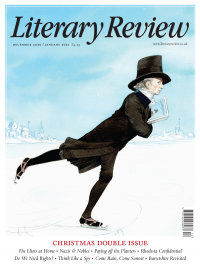James Purdon
Blackout Sunday
The Silence
By Don DeLillo
Picador 128pp £14.99
Since the behemoth Underworld (1997), Don DeLillo’s novels have tended towards brevity, with even the longest, 2016’s Zero K, coming in at under three hundred elegantly spare pages. While they have been slim, however, these novels have not been slight. Their meditations – the word is apt for a novelist fascinated by the esoteric in all its secular and sacred forms – have encompassed runaway finance, 9/11, the ‘War on Terror’ and the hubris of transhumanism. In each of them, DeLillo has returned to themes developed at length in his earlier, more copious work, recapitulating them in more concentrated form. At 116 pages of text, picked out in a spacious retro typewriter font, The Silence is his shortest stand-alone work yet, though to describe it that way is perhaps a little misleading, given how insistently it calls back to his earlier fiction. The prose here frequently reads as the work of a novelist reflecting on – assessing, revising, puncturing – his own signature style: ‘Half sentences, bare words, repetitions. Diane wanted to think of it as a kind of plainsong, monophonic, ritualistic, but then told herself that this is pretentious nonsense.’ Mannered, knowing, occasionally perverse, this is not a novel that will endear itself to DeLillo newcomers, and indeed there may be old hands for whom its self-referential comedy goes too far.
The central motif of The Silence is a high-stakes televised American football game, zapped into broadcast limbo by some enigmatic electrical disaster. In this, the novel recalls both End Zone, DeLillo’s 1972 gridiron satire of nuclear strategy, and 1985’s TV-obsessed White Noise, with its mysterious ‘Airborne Toxic Event’. Preparing to

Sign Up to our newsletter
Receive free articles, highlights from the archive, news, details of prizes, and much more.@Lit_Review
Follow Literary Review on Twitter
Twitter Feed
Alfred, Lord Tennyson is practically a byword for old-fashioned Victorian grandeur, rarely pictured without a cravat and a serious beard.
Seamus Perry tries to picture him as a younger man.
Seamus Perry - Before the Beard
Seamus Perry: Before the Beard - The Boundless Deep: Young Tennyson, Science, and the Crisis of Belief by Richard Holmes
literaryreview.co.uk
Novelist Muriel Spark had a tongue that could produce both sugar and poison. It’s no surprise, then, that her letters make for a brilliant read.
@claire_harman considers some of the most entertaining.
Claire Harman - Fighting Words
Claire Harman: Fighting Words - The Letters of Muriel Spark, Volume 1: 1944-1963 by Dan Gunn
literaryreview.co.uk
Of all the articles I’ve published in recent years, this is *by far* my favourite.
✍️ On childhood, memory, and the sea - for @Lit_Review :
https://literaryreview.co.uk/flotsam-and-jetsam